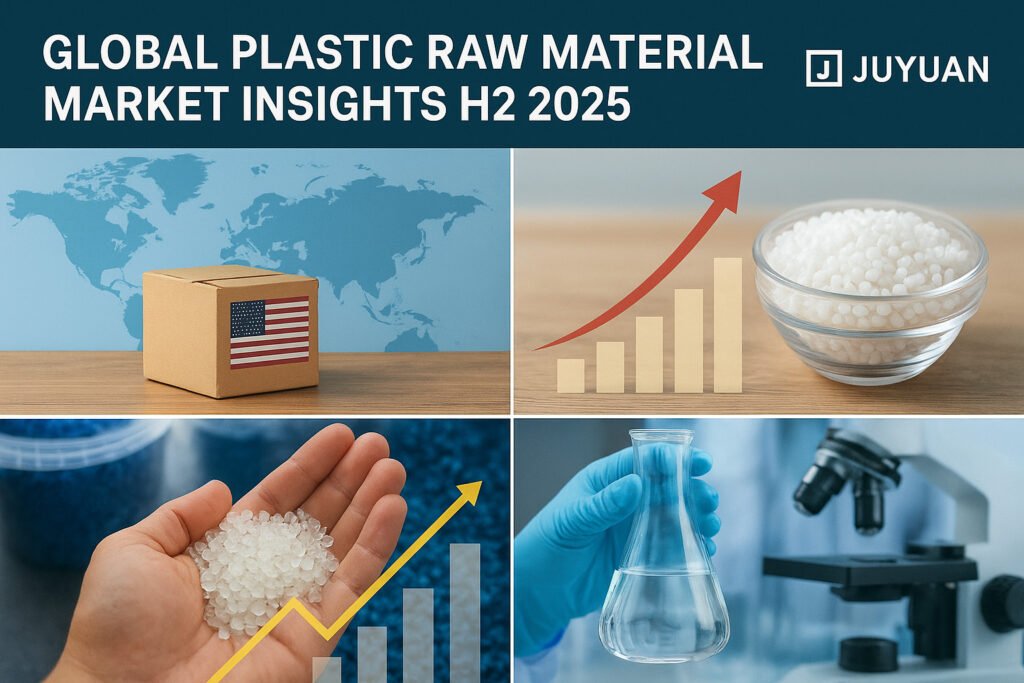Introduction
In the second half of 2025, the global plastic raw materials market was impacted by multiple factors, including policy, trade, supply and demand, technological innovation, and environmental regulations. Prices and supply chains for general-purpose plastics such as PET, polyethylene, and ABS, as well as engineering plastics and bio-based materials, fluctuated. This article summarizes developments in six key areas: policy, cost, supply and demand, technology, environmental protection, and trends, to provide buyers with a reference for decision-making. Some data is sourced from industry reports and news, while others are industry estimates. The specific situation varies by region and company.

🌍 Policy and Trade Dynamics
US PET Tariff Adjustment
In September 2025, the United States announced the restoration of standard tariffs on imported PET (virgin and recycled), reaching up to 50%. The rapid implementation of this policy caused some Southeast Asian and Indian suppliers to divert some supply to Europe, exacerbating local tensions. The policy also sparked domestic controversy over its constitutionality.
China's PET Market Under Pressure
China's total PET production capacity will exceed 30 million tons in 2024, while demand will be approximately 25 million tons, resulting in significant overcapacity. Processing fees fell by over 30% year-on-year, with some leading companies reducing production. Changes in global trade may further intensify domestic competitive pressure.
📈 Price and Cost Changes
Companies Raise Prices: Kuraray, UBE, Celanese, and others have successively raised prices for some engineering plastics.
Impact of Crude Oil Fluctuations: Rising WTI and Brent prices have pushed up production costs, leading to slight price increases for PET and HDPE, while ABS and SBR have declined slightly.
🏭 Capacity and Supply and Demand
China's Polyethylene Market: New capacity is concentrated in South and North China. Demand for agricultural and packaging films is gradually recovering, but orders remain weak.
ABS Market: Prices are relatively stable, with mainstream grades ranging between 8,700 and 9,000 yuan/ton, leaving limited room for negotiation.
🧪 Technological Innovation and R&D
Germany's Fraunhofer PBS: Developing over 20 bio-based PBSs with heat resistance up to 200°C, suitable for injection molding, extrusion, and thermoforming.
Japan's biodegradable plastics: Rapidly degrade in seawater, still in the experimental stage.
US PET Recycling Technology: Catalytically decomposes PET into high-value-added terephthalic acid (TPA), providing a potential path for chemical recycling.
UK's Xampla: Plant-based biodegradable packaging film secures tens of millions of dollars in financing, expanding applications in Europe and Asia.
🌱 Environmental and Regulatory Pressures
Pollution Incidents: The US and India have been penalized or caused accidents due to microplastic pollution.
International Negotiations: Differences remain on a global plastics treaty, with environmental organizations calling for stricter regulations on the production side.
🔎 Summary and Trend Outlook
Policies Reshaping the Market: US tariffs and overcapacity in China are altering the global flow of PET.
Continuing Cost Pressure: Rising oil and raw material prices are compounding.
Supply-demand imbalance risk: China's new PE production capacity is being released faster than demand.
Green technology advancement: High-heat-resistant PBS, biodegradable plastics, and chemical recycling technologies are gradually being industrialized.
Stricter environmental regulations: The industry needs to accelerate its transition to a circular economy and sustainable development.
❓ FAQ
Q1: Plastic price trends?
Short-term high volatility, with some categories potentially experiencing declines in the medium to long term. It's recommended to lock in supply contracts and diversify channels in advance.
Q2: Major supply chain risks?
Tariffs, environmental policies, and transportation accidents. It's recommended to establish a multi-regional supply network.
Q3: Procurement concerns?
Regarding policies, costs, and new materials, prioritize suppliers that can guarantee stable supply and offer green solutions.
🤝 Why choose Juyuan?
Global supply chain network: Covering Asia, Europe, and the Middle East, ensuring a diversified supply base.
Comprehensive product portfolio: Comprehensive coverage of general-purpose plastics, engineering plastics, and specialty materials.
Compliance and environmental advantages: Providing recycled and biodegradable materials to support regulatory compliance.
One-stop service: From material selection to logistics, we reduce procurement costs and risks.
📩 Contact us for the latest quotes and customized procurement solutions.

